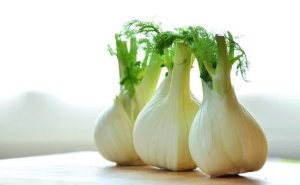Written by Jessica Patella, ND. This study shows that fennel as a phytoestrogen is effective in reducing menopausal symptoms and has no serious side effects.
 Menopause is defined as the lack of menses for 12-months. In the United States, the median age of menopause is 51 years of age, with an estimated 1.3 million women entering menopause each year 1. Most women experience vasomotor changes, more commonly referred to as hot flashes, but urogenital, psychological and cardiovascular effects also occur. With women living longer (approximately one-third of their life in post-menopause) and negative side effects of hormonal treatment, many women seek complementary and alternative options 1,2. A recent randomized study found fennel to be effective for symptoms of menopause 2.
Menopause is defined as the lack of menses for 12-months. In the United States, the median age of menopause is 51 years of age, with an estimated 1.3 million women entering menopause each year 1. Most women experience vasomotor changes, more commonly referred to as hot flashes, but urogenital, psychological and cardiovascular effects also occur. With women living longer (approximately one-third of their life in post-menopause) and negative side effects of hormonal treatment, many women seek complementary and alternative options 1,2. A recent randomized study found fennel to be effective for symptoms of menopause 2.
Foeniculum vulgare Mill., commonly known as fennel, acts as a phytoestrogen in the body. It has been shown to be effective for increasing breast milk 3, improving premenstrual symptoms 4 and improving menopausal symptoms in women 5. Yet, there have been few blinded and placebo-controlled clinical studies on fennel and its effects on menopausal symptoms.
The research included 90 post-menopausal women (1-5 years post-menopause), that were randomized into either a fennel group (n=45) or placebo group (n=45). Fennel essential oil was extracted for the fennel capsule (100mg), while the placebo capsule was filled with sunflower oil. Each woman received 2 capsules per day for 8 weeks. The study was triple-blinded such that the participants, investigators and the person analyzing the data were blind. The Menopause Rating Scale (MRS) questionnaire was given at baseline and weeks 4, 8, 10 of the study, to measure the severity of 11 symptoms associated with menopause 2.
The results were as follows:
| Average MRS score in Fennel Group | |
|---|---|
| Baseline | 20.02 +/- 6.18 |
| Week 4 | 11.20 +/- 4.92 |
| Week 8 | 9.35 +/- 4.54 |
| Week 10 (2-weeks post supplementation) | 13.05 +/- 4.94 |
*There was no significant change in the placebo group
*P<0.001 between scores at baseline and weeks 4, 8, 10
*P<0.001 between scores at 4, 8, 10 weeks compared to placebo
These results indicated a statistically significant improvement in symptoms, while the increase in symptoms at week 10, indicate that fennel supplementation is needed to see the effects 2.
In conclusion, the supplementation of fennel daily was shown to be effective in reducing symptoms of menopause, without serious side effects 2. Researchers suggest it be considered for decreasing symptoms of menopause 2. Future research with more participants and for a longer duration is recommended.
Source: Rahimikian, Fatemeh, Roja Rahimi, Parvin Golzareh, Reza Bekhradi, and Abbas Mehran. “Effect of Foeniculum vulgare Mill.(fennel) on menopausal symptoms in postmenopausal women: a randomized, triple-blind, placebo-controlled trial.” Menopause 24, no. 9 (2017): 1017-1021.
© 2017 by The North American Menopause Society
Posted August 18, 2020.
References:
- Ketvertis KPKM. Menopause. StatPearls; 2020.
- Rahimikian F, Rahimi R, Golzareh P, Bekhradi R, Mehran A. Effect of Foeniculum vulgare Mill. (fennel) on menopausal symptoms in postmenopausal women: a randomized, triple-blind, placebo-controlled trial. Menopause. 2017;24(9):1017-1021.
- Honarvar F, Tadayon M, Afshari P, Namjooyan F, Haghighi MH. The effect of Foeniculum vulgare on serum prolactin level in lactating women. The Iranian Journal of Obstetrics, Gynecology and Infertility. 2013;16(65):18-24.
- Delaram M, Heydarnejad MS. Herbal Remedy for Premenstrual Syndrome with Fennel (Foeniculum vulgare)–Randomized, Placebo-Controlled Study. Age. 2011;55(5.6):57.53-56.58.
5. Yaralizadeh M, Abedi P, Najar S, Namjoyan F, Saki A. Effect of Foeniculum vulgare (fennel) vaginal cream on vaginal atrophy in postmenopausal women: A double-blind randomized placebo-controlled trial. Maturitas. 2016;84:75-80.

